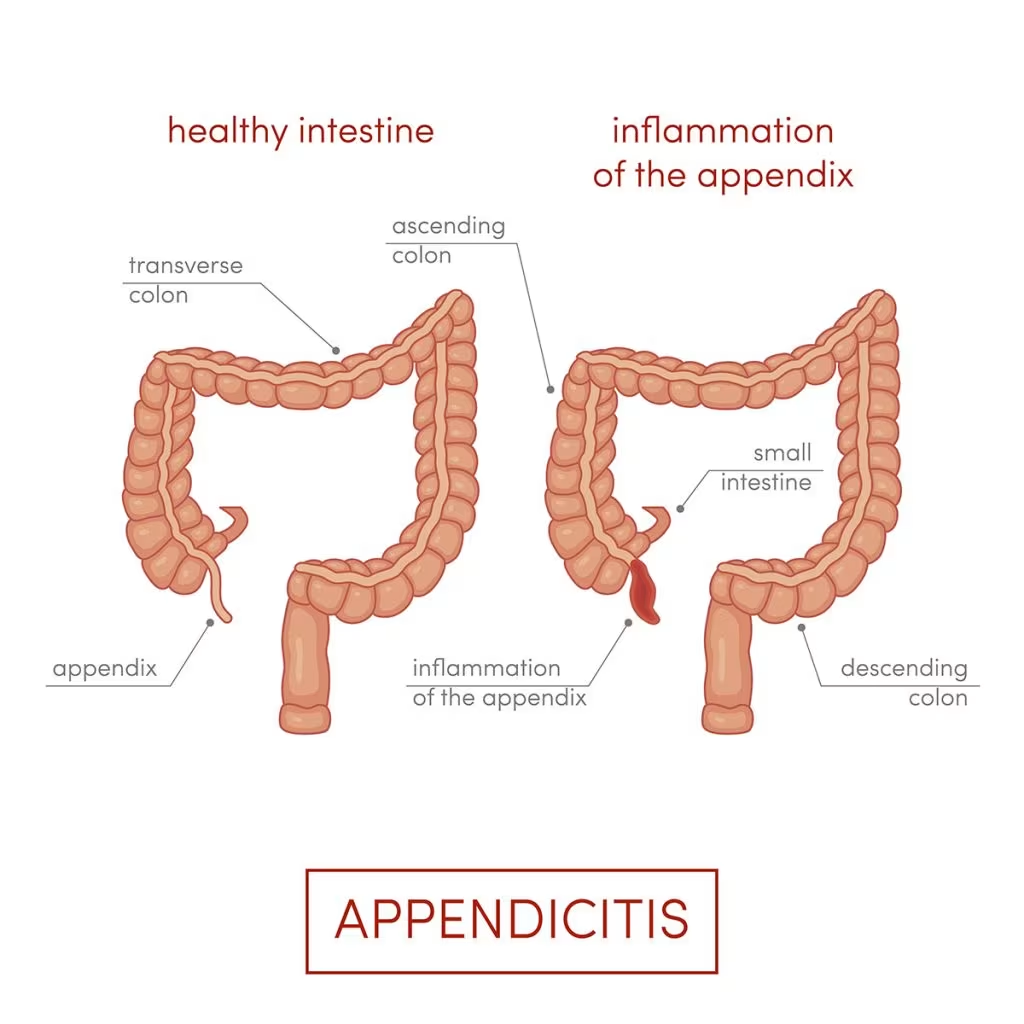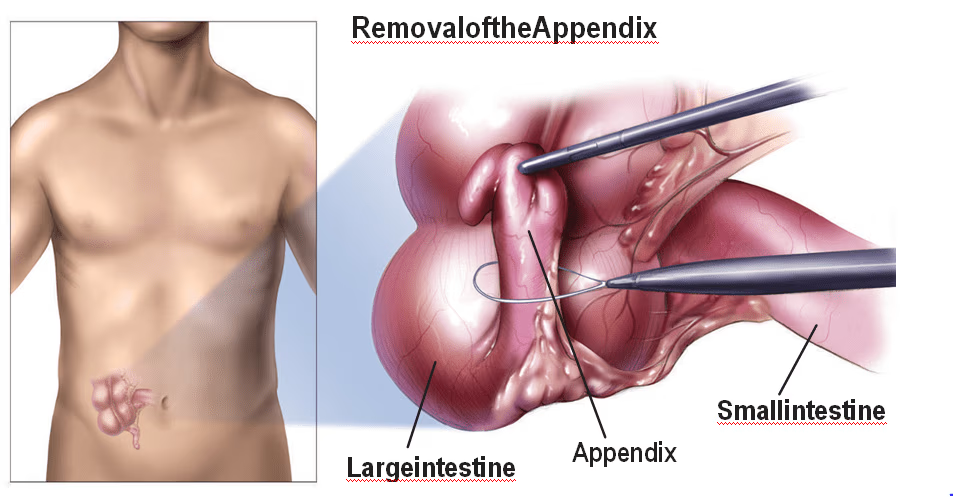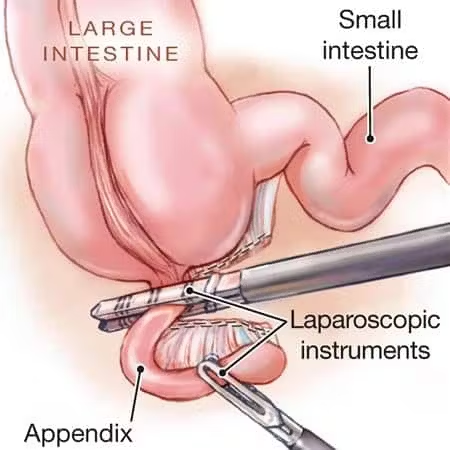Appendicitis is a common medical emergency requiring prompt intervention. This comprehensive guide covers everything you need to know about appendicitis treatment in Singapore, from symptoms and diagnosis to surgical options and recovery.
What is Appendicitis?

Appendicitis is the inflammation of the appendix, a small finger-shaped pouch about 4 to 8 centimeters long that protrudes from the lower right end of the large intestine (colon).
While the exact function of the appendix remains inconclusive, when it becomes inflamed, it requires immediate medical attention as it can lead to serious complications if left untreated.
Causes of Appendicitis
The exact cause of appendicitis is often unclear, but it typically occurs when the appendix becomes blocked.
Potential causes include blockage by fecal material or hardened stool, enlarged lymphoid follicles, intestinal or gastrointestinal infections (whether viral or bacterial), parasites or intestinal worms, tumors, trauma to the abdomen, and foreign objects.
When the appendix becomes obstructed, bacteria multiply rapidly within the blocked organ, causing inflammation, swelling, and causing the appendix to fill with pus.
If not treated promptly, the appendix can rupture within 24-72 hours of symptom onset.
This might help: Health Screening in Singapore
Risk Factors for Appendicitis
Several factors may increase the risk of developing appendicitis. Age is a significant factor, as appendicitis is most common between 10 and 30 years of age, though it can occur at any age.
Gender also plays a role, with males having a slightly higher risk than females. Family history is another important consideration, as those with first-degree relatives who have had appendicitis face higher occurrence rates.
Additionally, previous gastrointestinal infections may increase the risk of developing this condition.
Types of Appendicitis
Acute Appendicitis
This is the most common form, developing rapidly over 24-48 hours. The appendix becomes increasingly inflamed and painful as bacteria multiply.
Without treatment, the appendix can rupture, leading to peritonitis, a serious condition requiring emergency intervention.
Chronic Appendicitis
This rarer form (affecting approximately 1.5% of appendicitis cases) involves inflammation that persists at a lower level over weeks or months.
Symptoms may come and go, making diagnosis challenging. Patients may experience several episodes before receiving a correct diagnosis.
This will help: Best JB Health Screening Clinics for Singaporeans
Symptoms of Appendicitis
The development of appendicitis symptoms reflects the progression and severity of the inflammation:
Initial Symptoms
- Pain that begins around the navel (periumbilical pain)
- Pain that gradually shifts to the lower right abdomen
- Sudden sharp pain that intensifies over several hours
Progressive Symptoms
- Abdominal pain that worsens when coughing, walking, or making sudden movements
- Nausea and vomiting (usually after pain begins)
- Loss of appetite
- Low-grade fever (37.2°C to 38°C)
- Inability to pass gas
- Constipation or diarrhea
Related article: The Ultimate Guide to Losing Weight in Singapore
Advanced Symptoms
- High fever (above 38.3°C)
- Abdominal swelling and tenderness
- Rebound tenderness (pain when pressure on the lower right abdomen is suddenly released)
- Rigidity in the abdomen
The pain location may vary depending on a person’s age and the position of the appendix:
- Children and teenagers typically experience pain in the lower right side of the abdomen
- Pregnant women may feel pain around the upper abdomen as the appendix is positioned higher during pregnancy
Related article: Acid Reflux and GERD in Singapore: Causes, Symptoms, and Treatments
When to Seek Medical Attention
Appendicitis is a medical emergency.
If you experience any of the following symptoms, seek immediate medical attention: sudden, severe pain in the lower right abdomen; pain that begins around the navel and shifts to the lower right abdomen; fever accompanied by abdominal pain; vomiting accompanied by abdominal pain; or inability to find a comfortable position due to abdominal pain.
It is important not to take pain medications, laxatives, or apply heating pads to the area, as these may cause an inflamed appendix to rupture.
Diagnosis of Appendicitis
Accurate and early diagnosis is critical for effective treatment. Healthcare professionals in Singapore typically use a combination of methods to diagnose appendicitis:
Physical Examination
A doctor will perform a thorough physical examination, checking for tenderness in the right lower abdomen, rebound tenderness (pain when pressure is released), Rovsing sign (pain on the right side when pressure is applied to the left side), and rigidity in the abdominal muscles.
Blood Tests
Diagnostic blood tests include a complete blood count (CBC) to check for elevated white blood cell levels, which indicates infection, and a C-reactive protein (CRP) test to detect inflammation in the body.
Related article: Celiac Disease Treatment in Singapore
Imaging Studies
- Computed Tomography (CT) Scan: Provides detailed cross-sectional images with approximately 98% accuracy in diagnosing appendicitis. This is the most common investigation in Singapore for confirming appendicitis.
- Ultrasound: Often used for children and pregnant women to avoid radiation exposure. Can show appendix inflammation and surrounding fluid collection.
- Magnetic Resonance Imaging (MRI): May be used in specific cases, particularly for pregnant women.
Additional Tests
- Urine Test: To rule out urinary tract infections or kidney stones that might cause similar symptoms
- Pelvic Examination: For women, to rule out gynecological conditions like pelvic inflammatory disease or ovarian cysts
- Pregnancy Test: For women of childbearing age, to rule out ectopic pregnancy which can mimic appendicitis symptoms
You might like: Functional Dyspepsia Treatment in Singapore
Treatment Options for Appendicitis in Singapore
Non-Surgical Management
In select cases of early, uncomplicated appendicitis, non-surgical management may be considered:
- Antibiotics: Some cases of mild, uncomplicated appendicitis may respond to antibiotic therapy. However, this approach requires careful monitoring and has a 30% chance of recurrence within one year.
- Conservative Management: For patients who cannot undergo immediate surgery, treatment may include bowel rest, intravenous fluids, and antibiotics while preparing for delayed surgery.
It’s important to note that while antibiotics may temporarily improve the condition, the standard of care for appendicitis in Singapore remains surgical removal of the appendix, as stopping antibiotics often results in relapse.
You might be interested: Hysterectomy in Singapore: Costs, Risks, Treatment
Surgical Treatment: Appendectomy
Appendectomy (surgical removal of the appendix) is the definitive treatment for appendicitis. In Singapore, there are two primary surgical approaches:
Laparoscopic Appendectomy (Keyhole Surgery)

This minimally invasive procedure has become the standard of care in Singapore for treating uncomplicated appendicitis:
- Procedure: Involves making 3 small incisions in the abdomen through which a laparoscope (thin tube with a camera) and specialized surgical instruments are inserted. The surgeon views the internal organs on a monitor and removes the inflamed appendix.
- Advanced Technique: With improved instrumentation and more experienced laparoscopic surgeons, the appendix can now be removed entirely through the umbilicus as a single-site laparoscopic procedure, resulting in an almost “scarless” result with a wound less than 2 cm hidden in the navel.
- Advantages:
- Less post-operative pain
- Faster recovery (typically 1-2 weeks)
- Minimal scarring
- Shorter hospital stay (most patients are discharged within a day or two)
- Quicker return to normal activities
Open Appendectomy

Traditional open surgery may be necessary in certain situations:
- Procedure: Involves making a single, longer incision (about 5-10 cm) in the lower right side of the abdomen to remove the appendix.
- When it’s used:
- For complicated cases such as a ruptured appendix
- When there’s an abscess present
- For patients with certain pre-existing medical conditions (heart disease, chronic obstructive pulmonary disease)
- When the appendix is difficult to access laparoscopically
- Recovery: Generally takes 2-4 weeks, with a slightly longer hospital stay compared to laparoscopic surgery.
You may be interested: Pituitary Gland Disorders Treatment in Singapore: Symptoms, Causes
Management of Complicated Appendicitis
Ruptured Appendix
If the appendix has ruptured with free pus in the abdominal cavity, immediate surgery is required to remove the appendix.
This procedure involves thorough cleaning of the abdominal cavity to remove pus and infectious material, administration of intravenous antibiotics to control infection, and possible placement of drains to remove any remaining infectious fluid.
Appendiceal Abscess
If the appendix has ruptured but the infection is contained as a walled-off abscess, treatment begins with initial drainage of the abscess via a tube placed through the skin under CT or ultrasound guidance.
Intravenous antibiotics are administered to control the infection, followed by an interval appendectomy (removal of the appendix) several weeks later after the infection has subsided.
Post-Surgical Care and Recovery
Hospital Stay
Patients typically stay in the hospital for 1-2 days after laparoscopic surgery, while open surgery may require a stay of 2-4 days. Longer stays may be necessary for complicated cases involving infection.
Immediate Post-Operative Period
During the immediate recovery phase, pain management is provided through prescribed medications, and early ambulation (walking) is encouraged to prevent complications.
Patients experience a gradual return to normal diet as bowel function returns, with intravenous fluids administered until oral intake becomes adequate. Continued antibiotics are given if infection is present.
Recovery at Home
Home recovery involves rest and gradually increasing activity levels. Patients should avoid strenuous activities for 2-4 weeks (up to 6 weeks for open surgery) and keep incision sites clean and dry.
It’s important to take prescribed medications as directed, stay hydrated, and eat nutritious, easily digestible food. Attending follow-up appointments as scheduled is essential for proper recovery monitoring.
Warning Signs During Recovery
Immediate medical attention should be sought if you experience increasing pain or tenderness in the abdomen, persistent or high fever, redness, swelling, or discharge from incision sites, persistent nausea or vomiting, severe constipation or inability to pass gas, or dizziness and feeling faint.
These symptoms may indicate complications that require prompt medical evaluation.
Preventing Appendicitis
While appendicitis cannot always be prevented, some measures may help reduce risk:
- High-Fiber Diet: Including fresh fruits, vegetables, whole grains, and legumes helps maintain healthy bowel function and may lower the risk of appendicitis by preventing blockages in the appendix.
- Regular Exercise: Supports digestive health and reduces the likelihood of issues contributing to inflammation.
- Prompt Medical Attention: Early recognition of symptoms ensures timely treatment, reducing the risk of complications.
Living Without an Appendix
The appendix is not an essential organ, and its removal has no known long-term effects on digestive or immune health.
People who have had an appendectomy can lead normal, healthy lives without any dietary or lifestyle modifications after full recovery.
Appendicitis Treatment Costs in Singapore
Treatment costs vary depending on several factors including the surgical approach, hospital choice, and whether complications are present.
Singapore citizens and permanent residents can use their MediSave for surgical treatment of appendicitis. It’s advisable to check with your insurance provider regarding coverage for appendicitis treatment.
FAQ Section
What are the warning signs of a ruptured appendix?
A ruptured appendix often presents with a sudden relief from abdominal pain followed by a rapid worsening of overall symptoms.
Key warning signs include widespread abdominal tenderness, high fever (above 38.3°C), rapid heart rate, rigid abdomen, confusion, and in severe cases, septic shock.
If you suspect your appendix has ruptured, seek emergency medical care immediately as this is a life-threatening condition requiring urgent surgical intervention.
Can appendicitis heal on its own without treatment?
While some mild cases of appendicitis might temporarily subside without intervention, this is uncommon and unpredictable. Most cases of appendicitis, especially acute ones, require medical intervention.
Attempting to “wait it out” is dangerous as an inflamed appendix can rupture within 24-72 hours of symptom onset, leading to peritonitis and potentially life-threatening complications. T
he standard medical advice is to seek immediate treatment if appendicitis is suspected.
Is recurrent appendicitis possible after antibiotics treatment?
Yes, recurrent appendicitis is possible if antibiotics are used as the only treatment. Studies show approximately 30% of patients treated with antibiotics alone experience recurrence within one year.
This is why surgical removal of the appendix (appendectomy) remains the definitive treatment for appendicitis in Singapore, as it eliminates the possibility of recurrence by removing the problematic organ entirely.
How long will recovery take after appendix surgery?
Recovery time depends on the surgical approach and whether complications occurred. For laparoscopic appendectomy, most patients can return to normal activities within 1-2 weeks, though strenuous activities should be avoided for up to 4 weeks.
For open appendectomy, recovery typically takes 2-4 weeks, with a recommendation to avoid strenuous activities for up to 6 weeks. Patients with complicated appendicitis requiring additional treatments may have longer recovery periods.
How are the symptoms of appendicitis different from other abdominal issues?
Appendicitis typically presents with pain that begins around the navel and gradually shifts to the lower right abdomen, becoming more intense over time.
This migration pattern, combined with tenderness at McBurney’s point (a specific location in the right lower quadrant), is fairly unique to appendicitis.
Other distinctive features include pain that worsens with movement, rebound tenderness, and progressive symptoms that rapidly worsen over 24-48 hours.
While other conditions like gastroenteritis, urinary tract infections, or gynecological issues may share some symptoms, they usually lack this specific pattern of pain migration and rapid progression.
Should I make changes to my diet after an appendectomy?
After full recovery from an appendectomy, no long-term dietary modifications are necessary.
The appendix does not play a significant role in digestion or nutrient absorption. However, during the immediate recovery period (first few weeks), a balanced, easily digestible diet is recommended.
Start with clear liquids and gradually progress to a normal diet as tolerated. Temporary avoidance of spicy, greasy, or gas-producing foods may help reduce discomfort during early recovery.
What should I do if I suspect I have appendicitis?
If you suspect appendicitis, treat it as a medical emergency. Do not take pain medications, laxatives, or apply heat to the area, as these may mask symptoms or increase the risk of rupture.
Do not eat or drink anything, as surgery might be needed. Go directly to the nearest Accident & Emergency department (A&E) or call for an ambulance.
Prompt medical evaluation is essential, as early diagnosis and treatment significantly reduce the risk of complications.
Is laparoscopic surgery always possible for appendicitis?
While laparoscopic appendectomy is the preferred surgical approach in Singapore for most cases of appendicitis, it is not always suitable for every patient.
Open surgery may be necessary if the appendix has ruptured with widespread infection, if there’s a large abscess, if the patient has had multiple previous abdominal surgeries creating adhesions, or if the patient has certain pre-existing medical conditions like heart disease or chronic obstructive pulmonary disease (COPD).
The surgeon will determine the most appropriate surgical approach based on the individual patient’s condition.
Are there any long-term effects of living without an appendix?
No significant long-term effects have been identified from living without an appendix. The body adapts well to its absence, and its removal does not impact overall digestive or immune health.
Recent research has suggested the appendix may serve as a reservoir for beneficial gut bacteria, but its removal does not appear to cause noticeable changes in digestive function or immunity in the vast majority of people.
After recovery from an appendectomy, most people lead completely normal lives without any lasting effects.
How do doctors determine whether to use antibiotics alone or perform surgery?
The decision between antibiotic therapy alone versus surgical intervention depends on several factors, including the severity of appendicitis, patient characteristics, and local medical protocols.
In Singapore, surgery remains the standard of care for most appendicitis cases. Antibiotics alone may be considered for very early, uncomplicated appendicitis or in cases where surgery poses significant risks.
This decision is made after comprehensive evaluation including clinical assessment, laboratory tests, and imaging studies.
The doctor will consider the patient’s overall health status, the presence of complications, and the potential risks and benefits of each approach before recommending a treatment plan.
Conclusion
Appendicitis is a common but serious medical condition requiring prompt attention and treatment.
With advancements in surgical techniques, particularly laparoscopic surgery, patients in Singapore can expect excellent outcomes with minimal discomfort and quick recovery times.
Understanding the symptoms and seeking immediate medical care at their onset is crucial to prevent complications and ensure the best possible outcome.
If you suspect appendicitis, don’t hesitate to seek emergency medical attention at the nearest hospital’s Accident & Emergency department or contact a specialist surgeon for consultation. With proper and timely treatment, you can expect a complete recovery and return to normal activities within a few weeks.

